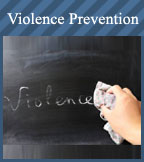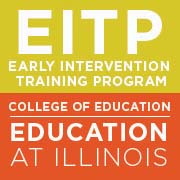Many factors which nurture adolescent violence can be traced to early childhood, and intervention is critical – especially in homes with poverty, single parenthood, poor education, poor resources, and a host of other similar factors typifying the inner city (i.e. lower-income residential district) neighborhoods.
Studies show that children who are witness and victims of violence are:
- More likely to be abused themselves
- At a high risk for developmental & mental health problems
- More likely to become aggressive & violent
According to years of study and research by the World Health Organization (WHO), success in violence prevention in youth – our most valuable commodity - begins with regular home visiting for children between the ages of 0-3 by health care and educational professionals and social workers. The impact of multiple services in high-risk e.g. low income, single parent, poor) homes conveys far beyond the therapeutic intervention of a given physical or speech therapist on a single or multiple domain of normal childhood development. Studies suggest that early such programs are delivered and the longer their duration, the greater the significant long-term effects in reducing violence and delinquency.
Violence prevention is extremely relevant to the early intervention provider of care who is an invaluable ‘eyes and ears,’ and for providing parental education, referral for additional services when needed, and for safety – in the prevention of violence. For example, an early intervention provider, by virtue of their often and intimate access to the home, may often be the first to detect signs that may predispose the home to health and safety concerns such as shaken baby or sudden infant death syndrome. Consequently, learning about how these and other forms of potential violence are detected and prevented is an onus of responsibility – imposed by the State early intervention boards of all States – as imperative upon early intervention providers of care as core to the health and safety requirement incumbent upon them as professionals.
Because of the close relationships developed between the parent, child, and ‘team’ of early intervention professionals, the child is better vouchsafed. The caring import of the interventionist communication, regular visiting, and demonstration of care - both in terms of the number of professionals involved with the child and the duration of years intervention presence in the home surrogates the child’s well being during their most impressionable and vulnerable stages of early growth, serving as a metaphorical bridge until such time that the often until the child transitions to the more comprehensive Counseling Psychology & Special Education (CPSE) school-based program(s), or Early Head Start Programs.
Violence Intervention curricula became mandatory is many professional settings, following the Columbine school massacres of children, by children. Learn how best to become aware of and respond to bullying, safety, security measures, aggressiveness, appropriate discipline, and a host of other very relevant topics in maintaining the safety of children in the school-based setting.Learn about your critical role in combating violence in the early intervention setting!
Sign up now for our NEW violence prevention course!
- Pending Approval Office of the NY State Board of Social Work -

This program is offered for 0.40 ASHA CEU's (Level: Various Content: Related)
* ASHA LEARNERS PLEASE NOTE: There are two purchase options available to you, EI Continuing Education and ASHA CEU. If you wish to earn ASHA CEUs for this course and you select the CEU option, your information including name, address, e mail and ASHA ID, will be sent to ASHA CE. If you do not want your information sent to ASHA, please select the option for continuing education. Learner must achieve a passing score of 75% on the post course examination in order to meet satisfactory completion requirements.

EITTOC is an AOTA Approved Provider of professional development. Course approval ID# 8922. This distance learning-independent is offered at 0.4 CEUs, introductory, Foundational Knowledge. The assignment of AOTA CEUs does not imply endorsement of specific course content, products, or clinical procedures by AOTA or indicate AOTA approval of a certification or other professional recognition.
Approved as a Core of Knowledge Training by the EXCELS Early Childhood Development: Maryland State Department of Education
APPROVED BY THE ILLINOIS EARLY INTERVENTION TRAINING PROGRAM FOR EARLY INTERVENTION CREDENTIAL CREDIT FOR
1 Hour Only
This course meets the Indiana State requirements for the annual credentialing process in the area of “Conferences & Workshops”
- Approved by the National Association of Social Workers (NASW) –
Disclosure: David C Saidoff PT - course developer/presenter - has the following relevant financial relationships to disclose: he receives monetary compensation for the preparation of this course, in addition to a percentage of company sales, and has the following relevant non-financial relationships to disclose: EITTOC Board of Directors: volunteer member. Melissa Whelan, OTR - course developer/presenter - has the following relevant financial relationships to disclose: she receives monetary compensation for the preparation of this course, in addition to a percentage of company sales, and has the following relevant non-financial relationships to disclose: EITTOC Board of Directors: volunteer member. KristenO’Leary,SLP, has the following relevant financial relationships to disclose: she receives monetary compensation for the preparation of this course, in addition to a percentage of company sales, and has the following relevant non-financial relationships to disclose:EITTOC Board of Directors: volunteer member. Rebecca SternLamm MSW,LCSW has the following relevant financial relationships to disclose: she receives monetary compensation for the preparation of this course, in addition to a percentage of company sales, and has the following relevant non-financial relationships to disclose:EITTOC Board of Directors: volunteer member. Janisha Verdejo, SLP, has the following relevant financial relationships to disclose: she receives monetary compensation for the preparation of this course, in addition to a percentage of company sales, and has the following relevant non-financial relationships to disclose: EITTOC Board of Directors: volunteer member.Declaration: Approval of this course does not necessarily imply that any of the governing bodies (e.g., West Virginian Board of Physical Therapy, or other such governmental or NGO’s supports the views of the presenter or sponsor. Information provided should be used within the scope of practice. No relevant financial or non-financial relationships exists between EITTOC or the products discussed any course; no such relationship or endorsement exists for any products mentioned in any courses sponsored by EITTOC, or in any of the items (such as specific AED or Epinephrine injection product) or any testing instrument used to evaluate children; the above course is specific to said-topic, and may not be extrapolated to any other course or topic outside the scope of this course. Course instructor(s) have no other financial or non-financial remuneration - whether prior to or following course delivery; the above advertisement is made available to all physical therapy (and other) licensee on a non-discriminatory basis. Ascend has approved this course and may be contacted about any concerns. Information provided should be used within scope of practice. AOTA does not endorse specific course content, products, or clinical procedures. The onus of responsibility for this course – granted contact hours by the AOTA – is for each OT professional to check with their State board of OT to see if this course meets licensure requirement for continuing education.
|








